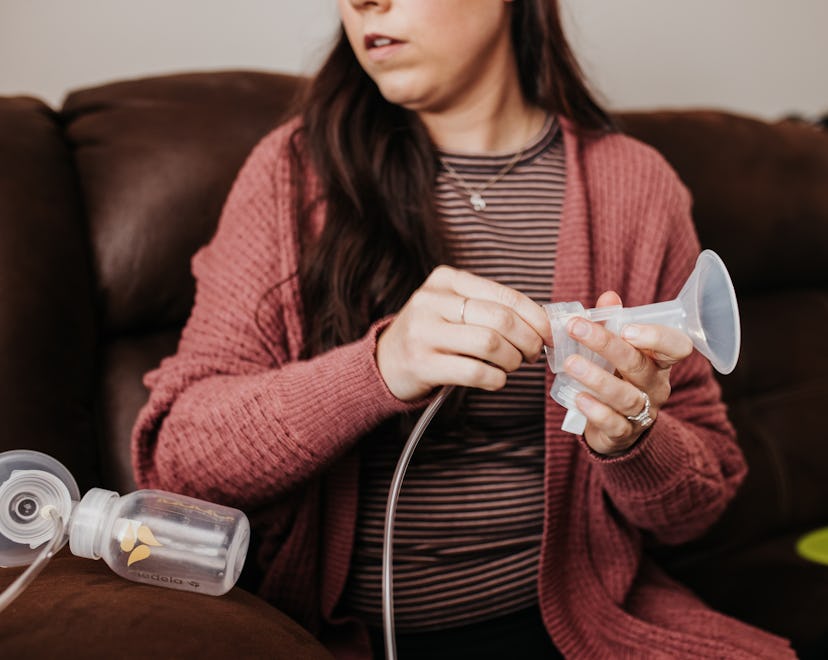Breastfeeding

How Breast Milk Adapts To Baby's Needs Even With Pumping
Seriously, breast milk is amazing.
Breastfeeding can be challenging, and there are many reasons why you might not be able to breastfeed your baby. For some, that means choosing to exclusively pump. But how does that differ from exclusively breastfeeding? Experts say the benefits of breast milk include how it changes to fit your little one's needs, but will your milk change if you're exclusively pumping? Is it the biology of suckling that lets your body know what your baby needs, or is it possible to make flu-fighting milk with your pump?
Breast milk is a powerhouse food that is designed to feed your infant perfect nutrition to allow them to grow and develop into healthy children over time. However, it's not always the easiest or best route for you and your child. It's often fraught with emotional implications and physiological complexities that don't rear their head until after you've decided to breastfeed.
Many women are still dedicated to the process, though. I know I was, in spite of my son's horrible initial latch period where he just couldn't get the hang of it, even after many attempts and several meetings with the lactation consultant. I understand intimately why someone would want to go the way of exclusively pumping, which I did for a long 18 months. But since breast milk is supposedly this malleable food that is reactive to the child, does the fact that the milk is expressed entirely away from the influence of your baby change the composition of the milk?
How Milk Changes From Breastfeeding To Pumping
There is little study on the differences in breast milk between breastfeeding and exclusively pumping, but that is changing. There is some research that suggests milk that is pumped is less adapted to baby's needs than milk that is expressed via pumping because the breast isn't exposed to the signal markers in the baby's saliva that trigger a bio-reactive shift in the composition in the milk via the mother's own receptors, according to Pediatric Clinics of North America. A study published about breast milk-saliva interactions found that a baby’s saliva reacts with the breast milk, going back in through the nipple, in order for your milk to adjust.
However, it’s still super beneficial for them to have your milk, no matter how it’s administered. “All breast milk contains antibodies and immune boosting compounds created by mom’s body,” says Molly Petersen, a certified lactation counselor.
“While feeding at the breast can help with the production of antibodies specific to an infection that the baby is fighting, exclusively breastfeeding moms don’t need to do anything to try and recreate this process,” she tells Romper. “Feeding baby your expressed breast milk is still the best option for giving them the immune boost they need when sick.” Petersen adds that breast milk production will always adjust to your baby’s needs. From colostrum in the early days to mature milk shortly thereafter, she says that your body will make the milk your baby needs to grow and develop.
“For moms who are exclusively pumping, it’s important to stay tuned in to your babies’ feeding habits. Because the baby isn’t feeding at the breast, it might be slightly harder to recognize changes, like cluster feeding for growth spurts, but as long as you are pumping milk based on your baby's feeding patterns, your body and milk will adjust.”
How Does Milk Adapt For Baby’s Needs?
Breast milk is also changeable during a period of hours when an infant is feeding from the breast. Research published in The Journal of Human Lactation posited that the protein density of the milk changes based on hunger triggers detected in irregular feeding patterns, seeking to attend to the baby's needs by providing more satiating food at subsequent feedings.
Breast milk changes again as the baby begins taking in solid food in addition to the breast milk. A study published in The American Journal of Clinical Nutrition found that the lipid content as well as sugars and proteins shifted once the children began receiving supplementary nutrition. The breast milk becomes quite dynamic — reacting to quality of diet and perceived needs based on the mechanisms of response in the mammary tissue.
Other Ways Milk Adapts For Baby, Even If Exclusively Pumping
However, we know that your body knows how long you were pregnant, and for how long you've been nursing because of the fatty content of the milk. The milk has more fats and proteins — pumped or expressed — in the case of preterm delivery, suggesting that while it might not have all of the shifts in enzymatic qualities of breast milk straight from breast to baby, it does shift in nutrient composition with time, according to a study in Early Human Development.
In the end, you have to do what works for you and your baby. Breast milk is amazing stuff, regardless of delivery. The way you feed your child is far less important than the fact that your child is fed.
Expert:
Molly Petersen, Certified Lactation Counselor (CLC) at Lansinoh.
Studies referenced:
Al-Shehri SS, Knox CL, Liley HG, et al. (2015) Breastmilk-Saliva Interactions Boost Innate Immunity by Regulating the Oral Microbiome in Early Infancy, PLoS One. https://www.ncbi.nlm.nih.gov/pmc/articles/PMC4556682/
Khan S, Hepworth A, Prime D. (2012) Variation in Fat, Lactose, and Protein Composition in Breast Milk over 24 Hours: Associations with Infant Feeding Patterns, Journal of Human Lactation. https://journals.sagepub.com/doi/abs/10.1177/0890334412448841
Harzer G, Haug M, Dieterich I, Gentner PR. (1983) Changing patterns of human milk lipids in the course of the lactation and during the day, The American Journal of Clinical Nutrition. https://academic.oup.com/ajcn/article/37/4/612/4690806
This article was originally published on